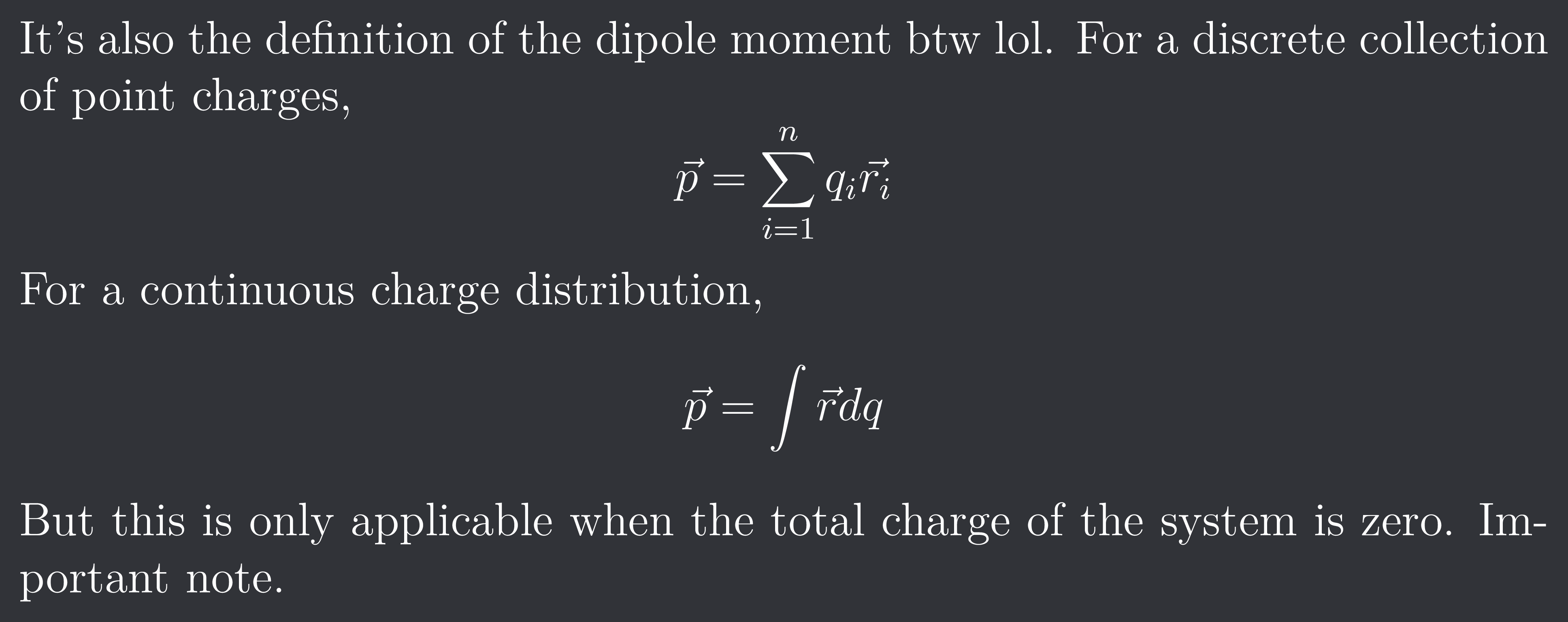Opt
IiTeachChem
•Created by Gamertug on 4/22/2025 in #💭│doubts
Capacitor
Circuit is broken at fully filled capacitors
38 replies
IiTeachChem
•Created by Gamertug on 4/22/2025 in #💭│doubts
Capacitor
There's no closed circuit at all....there won't be any current flow right?
38 replies
IiTeachChem
•Created by Sephrina on 4/21/2025 in #💭│doubts
dipole
$$\vec{p} = (+q)(0\hat{i}+a\hat{j}+0\hat{k})+(-2q)(0\hat{i}+0\hat{j}+0\hat{k})+(+q)(a\hat{i}+0\hat{j}+0\hat{k})$$
$$\vec{p} = q(a\hat{i}+a\hat{j})$$
$$\vec{p} = aq(\hat{i}+\hat{j})$$
10 replies
IiTeachChem
•Created by Gamertug on 4/22/2025 in #💭│doubts
Jee Adv Answering
I don't know that
11 replies
IiTeachChem
•Created by Gamertug on 4/22/2025 in #💭│doubts
Capacitor
That took me longer to understand than I would like.
E(in a dielectric) = (1/K)(field outside)
Field outside is sigma/epsilon nought
17 replies
IiTeachChem
•Created by Gamertug on 4/22/2025 in #💭│doubts
Jee Adv Answering
These are two separate questions. The format is:
- Passage
- Question 1
- Repetition of Passage
- Question 2
11 replies
IiTeachChem
•Created by Gamertug on 4/22/2025 in #💭│doubts
Capacitor
Once the dielectric is inserted, the potential difference remains same, but capacitance changes. Hence, more charge is pulled from the cell and the charge density on the plates changes
17 replies
IiTeachChem
•Created by Sephrina on 4/20/2025 in #💭│doubts
Electric dipole
It's also the definition of the dipole moment btw lol. For a discrete collection of point charges,
$$\vec{p} = \sum{i=1}^{n}q{i}\vec{r_{i}}$$
For a continuous charge distribution,
$$\vec{p} = \int\vec{r}dq$$
But this is only applicable when the total charge of the system is zero. Important note.
23 replies
IiTeachChem
•Created by Sephrina on 4/20/2025 in #💭│doubts
Electric dipole
It looks to be right aligned
23 replies
IiTeachChem
•Created by Sephrina on 4/20/2025 in #💭│doubts
Electric dipole
Its bigtext so supposed to be centre align
23 replies
IiTeachChem
•Created by Sephrina on 4/20/2025 in #💭│doubts
Electric dipole
Or you can do the vector sum of
$$\vec{p} = q{1}\vec{r{1}}+q{2}\vec{r{2}}+q{3}\vec{r{3}}$$
23 replies
IiTeachChem
•Created by Sephrina on 4/20/2025 in #💭│doubts
Electric dipole
You mean q,q, -2q?
23 replies
IiTeachChem
•Created by Sephrina on 4/20/2025 in #💭│doubts
capacitance
No, charge wants to go on the path where it is least resisted.
45 replies

